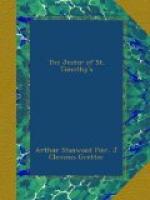Irving had triumphed, but after the first moment he felt surprisingly little satisfaction in his triumph. He could not help being sorry for Westby; the boy was after all right in feeling that he had been deprived of a victory to which he had been entitled. And as Irving looked at his downcast face, he softened still further; Westby had so often delighted in humiliating him, and he had longed for the opportunity of reprisal. Now it had come, and Westby was humiliated, and the audience were not unsympathetic with Irving for the achievement; yet Irving felt already the sting of remorse. Westby was only a boy, and he was a master; it was not well for a master to mortify a boy in the presence of other boys—a boy whose disappointment was already keen.
The letters were distributed; there was one for Irving from his brother. It contained news that made the world a different place from what it had been an hour ago. Lawrence was playing left end on the Harvard Freshman football eleven; not only that, but in the first game of the season, played against a Boston preparatory school, he had made the only touchdown. He added that that didn’t mean much, for he had got the ball on a fluke; still, the tone of the letter was excited and elated.
And it excited and elated Irving. He folded the letter and put it in his pocket; he sat for a moment looking out of the window with dreamy eyes and an unconscious smile. Lawrence was succeeding, was going to succeed, in a way far different from his own—if his own college course could be said in any sense to have terminated in success. Lawrence would have the athletic and the social experience which he had never had; Lawrence would be popular as he had never been; Lawrence would go brilliantly through college as he had never done. Everything now was in Lawrence’s reach, and he was a boy who would not be spoiled or led astray by the achievement of temporary glories.
In the vision of his brother’s triumphant career, Irving was transported from the troubles and perplexities, from the self-reproaches and the doubts which had been making him unhappy. He wanted now to share his happiness, to take the boys into his confidence—but one can share one’s happiness only with one’s friends. There was Westby, aggrieved and hostile; there was Carroll, sitting next to him, the queer, quizzical, silent youth, with whom Irving had been entirely unable to establish any relation of intimacy; no, there were no boys at his table with whom he was intimate enough to appeal for their interest and congratulations. And feeling this, he shrank from communicating the news,—though he felt sure that even Westby, who was going to Harvard the next year, might be interested in it; he shrank from anything like boasting. He found an outlet soon; Barclay came to see him that evening.
“I looked for you this afternoon, after the giving out of the prizes,” said Barclay. “But I couldn’t find you.”




